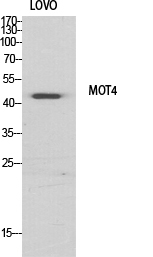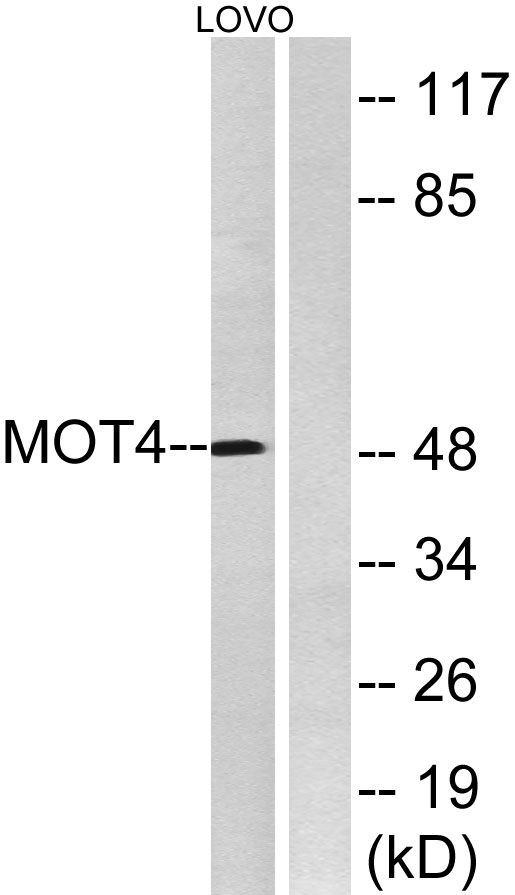MCT4 Polyclonal Antibody
- Catalog No.:YT2685
- Applications:WB;ELISA
- Reactivity:Human;Mouse;Rat
- Target:
- MCT4
- Fields:
- >>Central carbon metabolism in cancer
- Gene Name:
- SLC16A3
- Protein Name:
- Monocarboxylate transporter 4
- Human Gene Id:
- 9123
- Human Swiss Prot No:
- O15427
- Mouse Gene Id:
- 80879
- Mouse Swiss Prot No:
- P57787
- Rat Gene Id:
- 80878
- Rat Swiss Prot No:
- O35910
- Immunogen:
- The antiserum was produced against synthesized peptide derived from human MOT4. AA range:233-282
- Specificity:
- MCT4 Polyclonal Antibody detects endogenous levels of MCT4 protein.
- Formulation:
- Liquid in PBS containing 50% glycerol, 0.5% BSA and 0.02% sodium azide.
- Source:
- Polyclonal, Rabbit,IgG
- Dilution:
- WB 1:500 - 1:2000. ELISA: 1:40000. Not yet tested in other applications.
- Purification:
- The antibody was affinity-purified from rabbit antiserum by affinity-chromatography using epitope-specific immunogen.
- Concentration:
- 1 mg/ml
- Storage Stability:
- -15°C to -25°C/1 year(Do not lower than -25°C)
- Other Name:
- SLC16A3;MCT4;Monocarboxylate transporter 4;MCT 4;Solute carrier family 16 member 3
- Observed Band(KD):
- 49kD
- Background:
- Lactic acid and pyruvate transport across plasma membranes is catalyzed by members of the proton-linked monocarboxylate transporter (MCT) family, which has been designated solute carrier family-16. Each MCT appears to have slightly different substrate and inhibitor specificities and transport kinetics, which are related to the metabolic requirements of the tissues in which it is found. The MCTs, which include MCT1 (SLC16A1; MIM 600682) and MCT2 (SLC16A7; MIM 603654), are characterized by 12 predicted transmembrane domains (Price et al., 1998 [PubMed 9425115]).[supplied by OMIM, Mar 2008],
- Function:
- function:Proton-linked monocarboxylate transporter. Catalyzes the rapid transport across the plasma membrane of many monocarboxylates such as lactate, pyruvate, branched-chain oxo acids derived from leucine, valine and isoleucine, and the ketone bodies acetoacetate, beta-hydroxybutyrate and acetate.,similarity:Belongs to the major facilitator superfamily. Monocarboxylate porter (TC 2.A.1.13) family.,tissue specificity:Highly expressed in skeletal muscle.,
- Subcellular Location:
- Cell membrane; Multi-pass membrane protein.
- Expression:
- Highly expressed in skeletal muscle.
- June 19-2018
- WESTERN IMMUNOBLOTTING PROTOCOL
- June 19-2018
- IMMUNOHISTOCHEMISTRY-PARAFFIN PROTOCOL
- June 19-2018
- IMMUNOFLUORESCENCE PROTOCOL
- September 08-2020
- FLOW-CYTOMEYRT-PROTOCOL
- May 20-2022
- Cell-Based ELISA│解您多样本WB检测之困扰
- July 13-2018
- CELL-BASED-ELISA-PROTOCOL-FOR-ACETYL-PROTEIN
- July 13-2018
- CELL-BASED-ELISA-PROTOCOL-FOR-PHOSPHO-PROTEIN
- July 13-2018
- Antibody-FAQs
- Products Images

- Western Blot analysis of various cells using MCT4 Polyclonal Antibody diluted at 1:500
.jpg)
- Western Blot analysis of PC-3 cells using MCT4 Polyclonal Antibody diluted at 1:500

- Western blot analysis of lysates from LOVO cells, using MOT4 Antibody. The lane on the right is blocked with the synthesized peptide.



